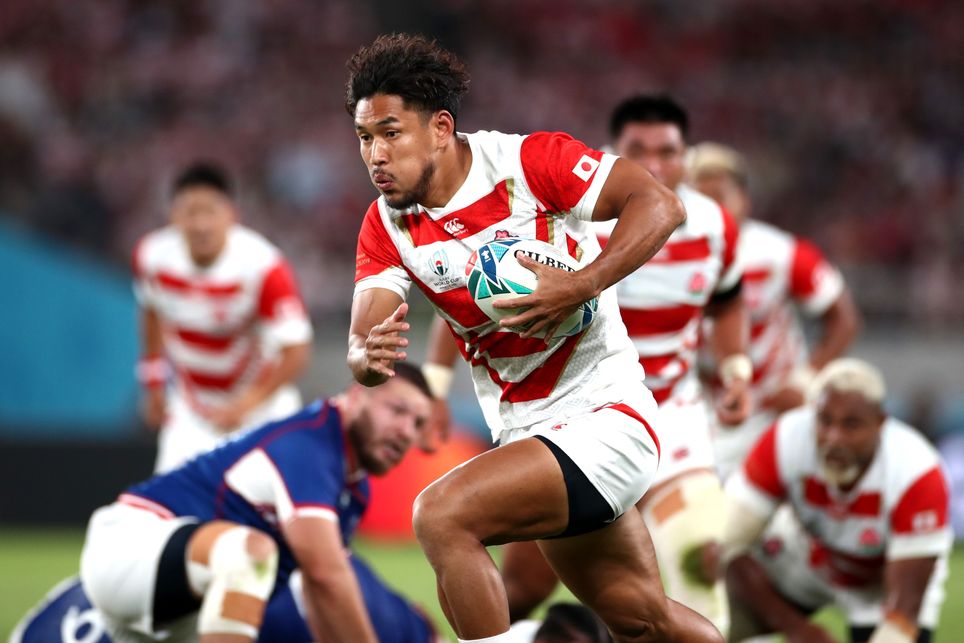In the movie business, it is so often the case that the sequel is not a patch on the original. Yet as the sense of anticipation grows around Japan’s World Cup rematch with South Africa on Sunday, it is a tantalizing prospect that the follow-up to the Brighton Miracle could be even more epic.
While Rassie Erasmus, the Springboks coach, began this week’s march to the quarter-final in Tokyo by smiling that he hoped he had heard the last of that 2015 sensation, there was never a chance of that as the memory of that remarkable day still looms large over the build-up.
Just in case you needed a reminder, here is the official blurb for the excellent new movie about the most astonishing game in World Cup history: “The story of what is regarded as the greatest sporting upset in history, Japan, the team with the worst record in rugby World Cup history, against South Africa, the two-time champions.
“It tells how the then Japan coach Eddie Jones masterfully plotted a result that endures as proof that the impossible is indeed possible. It’s a story of people with persistence and tenacity who dared to believe, and in doing so conquered an unbeatable foe and gave hope to millions.
While it forced South Africa coach Heyneke Meyer to issue a humbling apology to his proud rugby nation, it also provided a springboard for the thrilling revolution in the Japanese game that, four years on, has led us to the Brave Blossoms’ even more magnificent breakthrough here.
The seeds of the courage and daring that the side run by Jamie Joseph, Jones’s successor, have been displaying throughout their own tournament over the past few weeks were all there to be seen on that day at Brighton and Hove Albion’s football stadium as the clock ticked down.
Twice, as Jones roared for a kick at goal that would have tied the scores, captain Michael Leitch followed his own gut instinct, choosing to gamble everything on another scrum push towards immortality.
He would, he said, “rather go down challenging South Africa than kicking the goal, missing, and regretting it for the rest of my life”. It turned out, one of rugby’s true leaders now smiles, to be one of his better decisions.
The result, of course, traumatised South African rugby to the extent that even while he has been re-energising and transforming the national team, coach Erasmus understood the importance of exorcising that result from the Springbok psyche.
“In all honesty, the reason for that (World Cup) warm-up game (in Kumagaya against Japan on 6 September when South Africa won 41-7) was to erase the Brighton game, so that if we do play them in play-off games, that game hopefully doesn’t get mentioned again,” he said.
“It’s 1-1, and now we go into a quarter-final game against a really tough team. That game is in the past now.”
Not quite, perhaps. Even the Springboks’ newest star Cheslin Kolbe concedes: “I wouldn’t say it’s stuck in our head, but we know it happened.” Seven of Kolbe’s team-mates who were on duty that day, including six hardened forwards, will not have forgotten the humiliation either as they prepare for the rematch.
On the other side, eight of the 23 Japan players who will be carried on a national cherry-and-white wave of emotion on Sunday – Keita Inagaki, Shota Horie, Luke Thompson, Leitch, Yu Tamura, Kotaro Matsushima, Amanaki Mafi and Fumiaki Tanaka – have all been playing here as if still fuelled by the heady whiff of the day they shocked the world.
It still serves as the constant reminder for every Japanese player about the unfeasible being feasible. As their veteran second-row Thompson put it this week: “Four years ago, we were able to sneak up on South Africa and now it’s a completely different situation. No one expects us to win again – but we believe.”
A day at the English seaside made sure of that.


